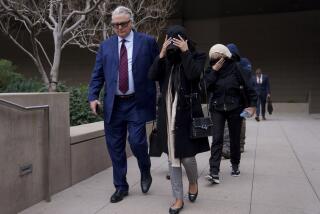Legal Documents Allege Silberman Waived His Right to Remain Silent : Money Laundering: Prosecution wants businessman’s statements to be used as evidence in his trial.
Prominent San Diego businessman Richard Silberman signed away his right to keep silent before he made statements to FBI agents immediately after his arrest last April on money-laundering charges, according to legal papers filed in federal court.
In a legal brief urging Judge J. Lawrence Irving to allow the post-arrest statements to be used as evidence at Silberman’s trial, federal prosecutors attached a document they said was Silberman’s written waiver of his constitutional rights.
Asking Irving to reject a claim by defense lawyers that Silberman was coerced into the statements, prosecutors said in the legal papers that the signed statement proves Silberman knew that anything he told the FBI agents could be used against him in court.
The brief, filed late Tuesday, was not made available publicly until Wednesday, a few hours before Silberman’s lawyers appealed Irving’s decision last week to release an FBI narrative report detailing Silberman’s behavior immediately after his arrest last April.
Releasing the narrative would jeopardize Silberman’s fair trial rights, his lead attorney, San Francisco lawyer James Brosnahan said in filing the appeal with the U.S. 9th Circuit Court of Appeals. There was no immediate indication how long the appellate court might take to rule on the request or whether it will agree to take the case.
Silberman, the husband of county Supervisor Susan Golding, is accused with reputed mobster Chris Petti and three others of laundering $300,000 in cash that an undercover FBI agent had characterized as proceeds from Colombian drug dealers. Their trial tentatively is scheduled to begin in April.
The government’s legal papers marked prosecutors’ formal opposition to defense requests to suppress evidence gathered during the 2 1/2-year investigation that led to Silberman’s arrest, including the statements he made to FBI agents just after his arrest in a Mission Bay hotel room.
Brosnahan had argued in papers filed two weeks ago that any post-arrest statements Silberman made could not be used at the trial because they were coerced by FBI agents preying upon Silberman’s “psychological weakness,” his fear of adverse publicity.
Assistant U.S. Atty. Charles Gorder argued, however, that Silberman volunteered the statements after not only signing the statement waiving his rights but after agents had read his rights to him twice.
Gorder also argued that Silberman’s claim that the statements were made as part of a plea bargain were equally without merit. Though statements made in bargaining are not allowed to be used in court, Gorder conceded, Silberman never told agents during the interview that he wanted to offer a guilty plea.
Much of the rest of the prosecution brief was devoted to the 1986 “roving wiretap” law under which prosecutors and FBI agents gathered much of their information in Silberman’s case. That, Gorder said, was because there were thousands of taps to detail and because Irving will be the first judge in the country to rule on the legality of the law.
Defense attorneys contended that the law violates Silberman’s privacy rights, catching him in wide-ranging taps--secretly made, among other places, at Petti’s residence, pay phones and various San Diego offices.
But, in urging Irving to uphold the taps--and, specifically, the information they yielded--Gorder said the law authorizing them legally balanced the “public’s reasonable expectation of privacy” and “law enforcement’s duty to detect and prosecute crime.”
The hearing at which Irving is scheduled to take up both sides’ contentions, originally set for Jan. 30, was pushed back to Feb. 6 to allow more time to prepare, a judge’s clerk said Wednesday.
More to Read
Sign up for Essential California
The most important California stories and recommendations in your inbox every morning.
You may occasionally receive promotional content from the Los Angeles Times.










